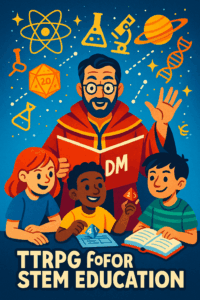Examining the Expertise of TTRPG for STEM Education: A Role-Playing Exploratory Study of Dungeon Master’s Praxis
By: Cristo León, Ph.D., & James Lipuma, Ph.D.
Blog post about the article by León and Lipuma (2025) published in Games in Learning and Teaching, last updated on November 10, 2025.
Introduction
This study investigates how Tabletop Role-Playing Games (TTRPGs) can inform STEM education by modeling scientific thinking through interactive, narrative-driven systems. The analysis focuses on the Dungeon Master (DM) as a pedagogical analog for teachers—facilitators of inquiry, creativity, and adaptive learning. By tracing the theoretical lineage from play studies to Role-Playing Game (RPG) frameworks, the authors examine how DM practices embody core principles of experiential learning (EL) and inquiry-based learning (IBL), offering insights into collaborative, reflective, and student-centered instruction.
Theoretical Framework
The research began with a bibliographic and conceptual review connecting experiential and inquiry-based pedagogies with RPG design. Prior literature suggested that TTRPGs enhance understanding by allowing participants to role-play problem-solving processes within fictional contexts. The study developed a mixed-methods survey instrument to document how Dungeon Masters structure narratives, manage uncertainty, and adapt to player decisions—mirroring how educators facilitate discovery in STEM settings.
Key Findings
- Dungeon Masters employ reflective, iterative facilitation similar to inquiry-based teaching.
- Role-playing fosters engagement, motivation, and applied problem-solving in STEM concepts.
- TTRPG dynamics model inclusive, collaborative learning environments aligned with experiential learning theory.
- DM expertise can inform educator training focused on adaptability and narrative design.
Impact and Relevance
This exploratory study bridges game design and pedagogy, highlighting how the creative praxis of Dungeon Masters parallels the facilitation strategies of effective educators. By formalizing these parallels, the paper contributes to transdisciplinary discourse on learning design, creativity, and engagement. The findings encourage educators to integrate role-play and simulation as reflective tools to strengthen inquiry and collaboration in STEM classrooms.
Cite this Paper
León, C., & Lipuma, J. (2025). Examining the Expertise of TTRPG for STEM Education: A Role-Playing Exploratory Study of Dungeon Master’s Praxis.
Games in Learning and Teaching, 1(1), 1–23.
https://newprairiepress.org/gilt/vol1/iss1/4
Volume: 1 | Issue: 1 | Pages: 1–23
Publisher: New Prairie Press
Rights: Open access, New Prairie Press, 2025
Keywords: RPG; TTRPG; Experiential Learning (EL); Inquiry-Based Learning (IBL); Mixed-Methods Research (MMR); Collaborative Learning; Facilitation Competencies; Game-Based Pedagogy
Interested in Exploring or Collaborating?
Are you researching games, education, or narrative-based learning?
Share this post, or cite the article to advance the conversation on experiential learning through role-play.
Versión en Español
Examinando la Pericia del Juego de Rol de Mesa (TTRPG) en la Educación STEM: Un Estudio Exploratorio sobre la Praxis del Director de Juego
Entrada de blog sobre el artículo de León y Lipuma (2025) publicado en Games in Learning and Teaching.
Introducción
Este estudio examina cómo los juegos de rol de mesa (TTRPG) pueden aplicarse en la educación STEM para modelar el pensamiento científico y promover el aprendizaje experiencial. El enfoque principal es el rol del Director de Juego (DM), cuya praxis creativa y reflexiva se asemeja al trabajo adaptativo del docente que guía la indagación y el aprendizaje colaborativo.
Principales Hallazgos
- Los DMs emplean estrategias similares a la enseñanza basada en la indagación.
- El juego de rol promueve la motivación, la colaboración y la aplicación práctica del conocimiento.
- La praxis del DM refleja principios de aprendizaje experiencial e inclusivo.
Cita el artículo
León, C., & Lipuma, J. (2025). Examinando la Pericia del Juego de Rol de Mesa (TTRPG) en la Educación STEM: Un Estudio Exploratorio sobre la Praxis del Director de Juego.
Games in Learning and Teaching, 1(1), 1–23.
https://newprairiepress.org/gilt/vol1/iss1/4

